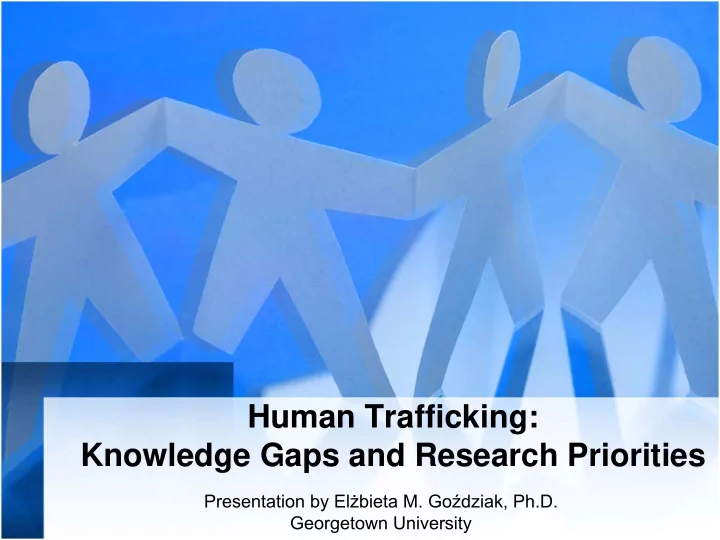

Human Trafficking: Knowledge Gaps and Research Priorities Presentation by El ż bieta M. Go ź dziak, Ph.D. Georgetown University
Journal Articles and Reports by Year, n = 228 & 536 100 90 Number of Publications 80 Journal Articles 70 Reports 60 50 40 30 20 10 0 1980 1987 1991 1993 1995 1997 1999 2001 2003 2005 2007 Year
Journal articles (N=218) Non-Empirical/Not Peer Reviewed, n=83, 37% Empirical Research/Peer Reviewed, n=36, Non-Empirical/Peer 16% Reviewed, n=96, 46% Empirical Research/Not Peer Reviewed , n=3, 1%
Populations Journal Articles - By Trafficked Population Women 36% Men 2% Girls Unknow n 2% 47% Boys 0% Children 13%
Reports-Empirical Research Empirical Research/Not Peer Reviewed , n=286, 67% Empirical Research/Peer Reviewed, n=6, 1% Non-Empirical/Not Peer Reviewed, n=134, 31% Non-Empirical/Peer Reviewed, n=3, 1%
Reports--Populations Reports - By Trafficked Population Unknown Women 3% 32% Children Men 6% 4% Boys Girls 21% 34%
Theory • Research influenced by ideology • Moral crusades • Research conducted by activists involved in anti- prostitution campaigns • Radical feminist theory – No distinction between trafficking for forced prostitution and voluntary migration (legal or irregular) for sex work • Research on trafficking for labor exploitation – disconnected from theory – no attempts to analyze the issue of cross-border trafficking for labor exploitation within exiting international migration theories – Poverty as the major “push factor”
Methodology • Lack of innovative methodologies • Reliance on unrepresentative samples • Reliance on interviews with ‘key stakeholders’ – Valuable ethnographic interviews – Untrained researchers – Participant observation • Small samples • Dangers of generalizing from small convenience samples are routinely ignored in the literature • Need to emphasize the limitations of small samples for generalizations and extrapolations • Need to stress the value of ethnographic investigations for hypothesis formulation
Recommendations • Need for quantitative and qualitative research to provide macro- and micro-level understanding of the phenomenon • Methodologically sound compilation of statistical data to inform appropriation of funds for counter-trafficking initiatives and services to survivors • Rigorous ethnographic and sociological studies based on in-depth interviews with trafficking survivors to obtain baseline data on their characteristics • Monitoring and evaluation studies to identify effective policies and best practices and assess success of programs • Lack of research-based policy, practice, and knowledge may inadvertently ‘deepen rather than loosen the factors that make trafficking both so profitable and difficult to address’ (Kelly 2002: 60)
Recommend
More recommend